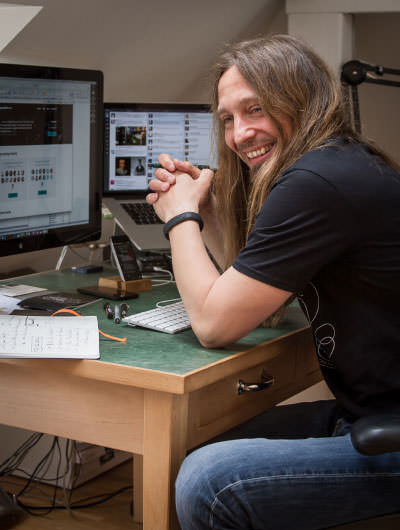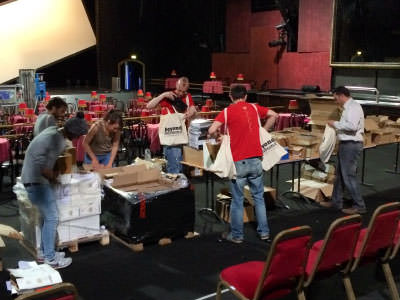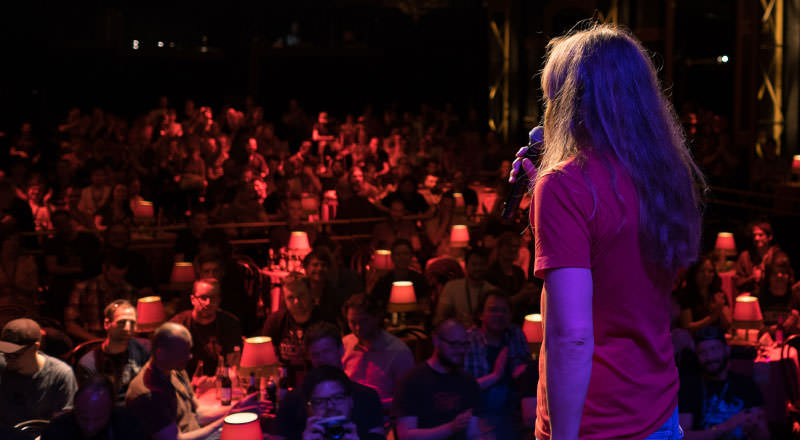An Event's Lifecycle: The Highs, The Lows, The Silence
I’m often talking about the joy I have when I run my events. During an event I meet so many wonderful people, talk to them, exchange ideas, and simply meet new and old friends. I enjoy standing in the back of the stage and watching the reactions of the audience while talks are going on. If the attendees are happy and have a fantastic experience during the two days, then I am happy and the warm words of the people who have been at the event, the tweets and written feedback, that is the best payment you can get.
Surely everybody organising and running events, at least if it comes from the heart, knows what I am talking about. But I am also certain, that you also know the other feeling before, during and after the event itself. The fear, the self-doubt, the excitement, the proudness, the loneliness, and all the other different faces of trying to be a good host.
From Sketch to Start

If the idea for an event grows in your head, you are roughly thinking about things like “What should the core topic, the theme be?” or “Whom can I invite to the event?”. You make notes for yourself, start lists and you speak to a few friends, to get an impression what they think about your idea for this event. These first conversations give you a very blurry image of how the event might look and feel and of what other people think about the event-idea. Based on this you decide you’ll give it a try. At this moment, latest, you can feel this kind of excitement in your stomach.
Now your engine is running. You are excited and you are full of ideas and questions like “What can I do to make this event special?”. At this point I sketch and take notes. On paper as well as digitally, as I think there are advantages for both ways. On the computer I use Evernote for writing longer notes on certain topics and Things to coordinate all the small things that turn into to-do’s. Even answering emails, if I can’t directly, will be taken to Things with a date to do it later. With this I do not have the annoying red dot with my inbox count rising. I make sure that these two apps are alway in sync between all my devices, just to be able to add and change notes and to-do’s in any situation.
Finding a Venue
After the first thoughts and turning your base idea, mentioned above, into a blue print for your event, you seek for a possible and fitting venue. That, as most of the show in the end, is a matter of taste and depending on what you want to underline with your venue, you have to search a bit longer. Surely you can go with a known venue for tech event or even an well organised hotel. Advantages are that most of these venues are well equipped and have a/v and wifi in house, so you don’t have to deal with many different people, which could save time, but not always money. I myself love the more adventurous venues. Those, who maybe don’t host events like this usually. It might be trickier sometimes to get the technical things sorted, but in the end, it always paid off for me at least.
What counts for tech also counts for catering. Usually places hosting conferences and alike have an in house catering service or can help you finding a service quickly as they often have worked with some in the past. If you don’t have to take their in house caterer (sometimes the contract does not allow you to book an outside service), it usually pays off to get as many quotes as possible. Mostly they try to give you their high class catering menu wich is very expensive and also, depending on your target audience, not matching the expectations or needs. Whatever your decision is, my experience is that food usually is always one of the most expensive parts and having the option to use your own catering service usually helps you to get that cost down and food you want/need.
First Doubts
So you have your venue, you have written possible speakers and partners. First speakers agree to come, but all of a sudden first declines drop in. A speaker said she can’t make it, a partner you already counted on to pay for the coffee is dropping out, because the person who has to finally decide about the budget said no. These are a few things, which can be a reason for having a very bad start into the day. You maybe start to think, if all this is the right thing to do, if you might have been too excited to see all the problems that could appear with organising such an event, when suddenly an email arrives, in which a partner you might have not thought to be on board agrees to come. Or a speaker who already said, that he maybe won’t be able to come due to family reasons surprisingly is able to come. What I mean is: don’t let problems destroy your general good mood and belief in your plan to run the event. Maybe simply switch of the computer again, before you have a bad day and get back a day later to get things sorted.
The High Before an Event
Obviously the closer the event gets, the more exciting you get and the more the workload grows. For me at least, about two weeks before the event, I am 120% on fire to get this show running. My family can’t do anything with me anymore. I don’t listen, I can’t focus on conversations, the only bit I see is the upcoming festival.
Equally to the excitement, my nervousness grows. I constantly worry and check if everything on my list is sorted. But you know how things are: people forget deadlines, things you need for print production are not sent to you and billions (at least it feels like billions) of people want to do last-minute changes to their tickets and badges.
This is also the time, when I start posting sneak previews of assets like the shirts for example or the things I prepare in homework like hand-stamped notebooks. Usually I share these things on Instagram, Twitter, or Facebook. I hope to grow excitement amongst the attendees with these sneak peeks so that not only me gets to the event, excited and pumped. I also used to cut out all badges by hand in the early days. All this leads to a rising level of excitement the closer an event gets.
The Event – Pure Adrenaline

The day before the conference days is our setup day. In Berlin it is the day, when the workshops are running. In Düsseldorf Side Events are taking place. On this day most of the exhibitors arrive to set up their booth. We pack 500 goodie bags for the attendees. During this day the pre- or early-registration opens, so that people who are already in town are able to grab their badge and don't have to queue up in the morning of the event days. We set up audio and video as well as all the other stuff in the venue such as light, decoration, and the general seating.
The first day of the event. We – that is me and the wonderful volunteers, helping me at each event – meet around 7:30am to prepare last bits and pieces and set up the partners, who weren’t able to set up the day before. I usually am on stage with my friends Boris and Steffen, responsible for a/v, to do a final check of audio, video, and all the tech that is needed to run the show.
9:00am – this is the time of the day, when we open the doors for registration. 500 people want to get in and most of them still need to get their name badges – if they didn’t get it the day before at the early registration. I try to cool down, get rid of my nervousness, sitting in the back of the theatre and thinking of anything that I might have forgotten or that possibly could go wrong.
About 45 minutes where I’m in something like a big bubble, not hearing anything, not able to answer questions, just focusing on to be prepared for what's coming.
9:45am – Theatre doors are opening. Tobi starts the music. I have butterflies in my stomach, but I am so happy and excited to see all the people coming into the theatre. I try to welcome and say hello to as many people as possible, before I hide behind the stage again to prepare myself to go on stage.

10:00am – The kickoff. The moment when I hit the play button for the opening titles and about 2 minutes before I enter the stage to welcome the audience. My heart is pounding like mad. Anything I did for the last 6 to 8 months for this event lead to this moment … will they enjoy the next two days?
The third talk is running and if no technical problems have occurred, I actually start to cool down a bit and to really enjoy the whole event. I love to have a look from behind the stage into the faces of the delegates to see, if they like it or not. The whole event passes by way too fast after all and a sad feeling appears around the lunch break of the second day already, that soon everything is over again.
After the Event – Silence
Right after the event, when the tear down of the exhibition and stage is done and everything is packed, usually a great and warm feeling fills the whole body. So many people already said that they enjoyed and liked the last two days a lot. Sometimes you even get the one or other unexpected present. A lot of very nice things have been said. It feels good, though I’m getting really tired. And of course you want to spend some time, having a few drinks with friends and people who are staying in town for another night. This is a great opportunity to gather feedback and already collect new suggestions and ideas for the next show.
At some point, late in the night you go to bed to get some – as I think – well deserved sleep. The next morning I usually have a hangover. And I don't mean the hangover caused by the one or other drink too much, but the event-hangover. During the last two or more days you have been constantly on fire, always 120% at the event and approachable for everybody and now you wake up and no one is waiting for you (it seems). There is no one talking to you, no one asking you questions, no one patting your back and telling you how well you did. There is just silence.

For a few days I feel, like I fell into a big, dark hole. I always describe the situation like this: I am walking my dog in the forest I live in and I feel this never-ending loneliness. Everything is so silent. I hear every sound much more intense. Birds, the wind in the leafs, the train passing by in the distance. Somehow it feels sad and absolutely lonely. If you want, you can say it is the opposite of what I experience right before and at the event itself. And because no one is talking to me, I get into self-doubt again.
Was the event any good?
Did the audience like the two days?
Is it still the right thing to do?
These and more questions like this pop up. I don’t know if you ever played in a band and had bigger concerts. This might be a similar feeling maybe. I think it is what you can call the post-conference blues.
But then the worst case happens: one person writes something like “I did not enjoy it as much as last time”.
I mean, this person hasn’t even written that it was shit, but still you feel like the whole event was a big failure. It starts raining, there will be no sun anymore and your life is over … something like this. But actually, if you stop and think again: it was only one person out of 500. Do not forget how many people already have said that they loved what you put on. But still, this one not-so-good comment is the one you see. I guess this is how most of us work. I myself tried to learn not to see this anymore, or better, to see it in relation to all the other comments and maybe even find something positive within negative critique. This is something different if the comment is a bad comment, which was made just caused by a matter of taste. Then I learned to understand and accept, that this event simply is not for everybody’s taste.
What usually also helps to get over the post-conference blues is the work that has to be done after an event. If you thought a conference is done, when it is over, then you are wrong. There is so much work that has to be done: thank-you emails to all people involved (speakers, partners, staff, etc.), final invoicing with speakers, paying invoices for hotel and much, much more. I really take this part as serious as all preparations. I send out a little wrap-up to the partners, to say thanks, to give them feedback, point them to photos and articles. I even write partners who haven’t been involved this time, to let them know I still care about them. All this work is important, has to be done, and helps to get over the time, when you feel empty and sad.
But the very best situation – at least for me – is, if you still have a few friends at your house right after the event of course. Just for a few days. One year, in April 2010, the volcano Eyjafjallajökull erupted right at the last day of the event and all airports in Europe had been closed. That made Joshua Davis (USA), John Davey (UK), Jens Brynildsen (Norway), Chris Pelsor (Norway), and Jesse Freeman (USA) being stuck at my house – perfect! Not only for me, my kids seem to enjoy all these international guests even more. It was a perfect time for me to cool down and do the after-event things when they left a week later. But obviously you can’t blow up a volcano after each event. So what to do?
The answer to this is: I don’t know really. Maybe this belongs to running an event with passion. A few days of sadness and emptiness before you start working on the post-conference organisation and before you are able to look forward to the next event. Maybe it is some kind of lifecycle: you plan an event and excitement grows and grows > it’s spring and buds start to appear; you run the event > you are in full bloom; the event is over and you are exhausted > you loose your leafs – maybe I’m getting to pathetic now … maybe not. The only thing I can give as advise is to completely suck up the positive energy that such an event gives you. All the good vibes, the nice atmosphere created by everybody involved. Safe this energy up until the next event.
I’d be really interested in hearing your experience with running an event, if you want to share it.
Update: I have written on this post over a few weeks. During the writing my second beloved brother died after fighting cancer for 10 years. Right before I was writing about the silence I feel after an event. Now this is all put into perspective. This silence is not comparable to any silence I ever experienced after an event – it’ll last forever.